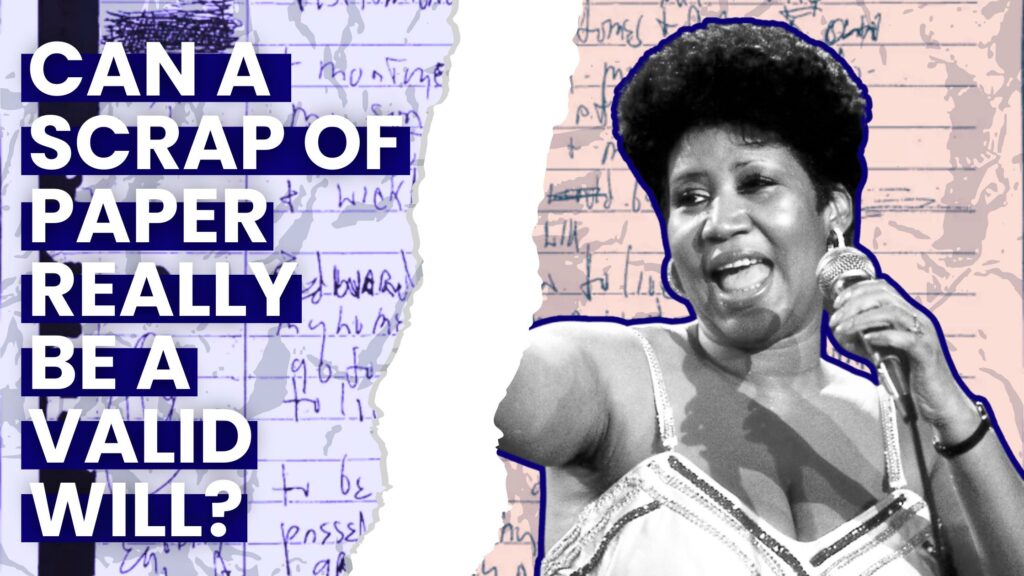Aretha Franklin is a household name around the world. Until now she was known for her stellar 50-year career as a soul singer and for her activism. But since her death in 2018 she has been in the news more as the latest in an increasingly long line of celebrities with complex estates because of their Wills (or lack of Wills).
Why Is Aretha Franklin’s Estate in the News?
Put very simply, because her family found a page of lined paper buried in a notebook of other writings and doodles, in between her sofa cushions after her death. This document set out her wishes for her estate after her death, and was written in 2014.
There was no question that it was written by Aretha, and no question of her having the mental capacity to write it. Despite this however, a legal dispute followed to determine whether or not it was a valid Will because of how it was written and where it was found. It has now been decided by the Court that it is a valid Will, and that it cancels one made four years earlier in 2010.
The newer Will distributes Aretha’s property differently between her sons than the 2010 Will did, and so it was important to all of them for the issue to be resolved formally by a Court, so that each person’s inheritance was clear. The newer Will also changed who could be her Executor. For more details about the decision, have a look at this BBC News story.
What Is a Will?
A Will is a document, which must meet certain criteria to be valid. The criteria differ from country-to-country and so what has now been confirmed to be a Will in the USA may not have been found to be a Will here in England and Wales (the rules differ in Northern Ireland and Scotland).
To be a valid Will in England and Wales, a document must:
- Be in writing, signed by the Testator*, or by some other person in his/her presence and at his/her direction; and
- Appear that the Testator intended to make the Will legally binding by signing it; and
- Have two witnesses to the Testator’s signature, who must see the Testator sign; and
- The witnesses must then also sign.
As long as the document meets these requirements, then it will be treated as a valid Will here in England and Wales – even if it is handwritten and hidden in a notebook like Aretha’s 2014 Will was!
A testator is the person who has made a will. If a person dies without a will they are deemed to have died ‘intestate’, i.e. without a will.
An executor is the person (or persons, known as executors) who are entitled to act in the administration of your estate.
Should a Will Be Dated?
Strangely, in England and Wales a Will does not need to be dated but ensuring each Will you make is dated makes it easier for your Executors* to work out which Will is most recent and therefore the one they should be using to deal with your estate.
If Aretha’s Wills had not been clearly dated, then the Court would have had an even harder job to decide which was written first. They would have to get evidence from witnesses and from other records (if there were any) to find out when each document was written and therefore which was most recent.
Can I Write My Own Will?
The short answer is “yes”. You can write your own Will, using any form of wording and any written format that you wish. You can also buy pre-printed Will forms and complete them.
But beware! It is a fact in relation to Wills that ‘you don’t know what you don’t know’ and it is very easy for someone without sufficient legal knowledge of Wills and the law around them to miss something out, or word something in a way that means the actual effect of the Will is not what they intended. Also, pre-printed Will forms use a “one size fits all” approach which is not the case. Your circumstances and wishes are not the same as anyone else’s, so why should your Will be?

BLOG: What Are the Dangers of DIY Wills?
A recent case has emphasised the potential issues and pitfalls that can arise from homemade DIY wills as there are no lawyers involved in the Will drafting process.
In the case of Henrietta Ingram & Anor v Simon Timothy Abraham & Anor, Joanne Abraham passed away in 2021. She left behind two children, Henrietta and Tom and two brothers, Simon and Nicholas.
Ms Abrahams amended her Will in 2019. The amended Will was made using an online Will template and was drafted by Simon (the first Defendant and her brother), leaving her residuary estate wholly to himself….
Want to know more?
For advice specific to your circumstances, please contact one of our specialist solicitors. Whether you wish to contest a Will, make a Will, or indeed query the validily of a Will, our team can help.
Contact us
☎️ Call our Wakefield office on 01924 290 029
☎️ Call our Garforth office on 0113 246 4423
☎️ Call our Sherburn in Elmet office on 01977 350 500
☎️ Call our Ossett office on 01924 586 466
The content of this blog post is for information only and does not constitute formal legal advice and should not be relied upon as advice. Thornton Jones Solicitors Limited accepts no liability for any such reliance upon this content. Where the post includes links to external websites, Thornton Jones Solicitors Limited accepts no responsibility for the content of such sites. Any link to a third party website should not be construed as endorsement by Thornton Jones Solicitors Limited of any content, products or services which are outside our direct control.






